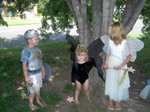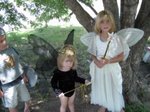Monday, March 23, 2009
1877 Letter 2nd Translation plus a Letter from a Cousin
Letter Page 1
Fuerstenwerder 16 October 1877
To you dear brothers-in-law and sisters-in-law in America.
For some time I have wanted to write you but until now this has not materialized.
Therefore with my writing I want to be your guest and want to chat with you about things
that have occurred. Motherkin has passed away but I think you may already have
known this through my husband’s and Fatherkin’s letter since my husband wrote
immediately on Sunday evening and Fatherkin on Monday morning. Then my husband
and Johann Willems went to Tokmak to a funeral of a Russian and they took the letters
with them. Tuesday was a funeral.
On Thursday the 30 of September there was a wedding at Gerhard Willems. The school
teacher married Anna Reimer. We also attended the wedding. From there I went to
Motherkin. She was swollen and felt cold, it was rather shocking to touch her. Her body
as well as her hands were
Letter Page 2
quite swollen up to her elbows. Then Maria brought her some Moos (fruit soup) and she
ate a little. She said that her independent eating would soon be over since she could not
hold the spoon securely in her hand. I told her that that Mrs. Frank Kornelsen passed
away yesterday. She replied saying it would not be many days before people would say
that she was dead too.
It was so by the following Sunday October 2nd at 7:30 AM was the hour that our dear
Heavenly Father called her home.
Jacob Brauns from Friedensruh attended her funeral and told us that Johan Braun was not
well. He was sick in bed for 8 days. On October 13 he was buried.
On the 8th of Oct we have butchered a cow. On the 13th of October they arrived with a
little son named Abraham. The mother
Letter Page 3
Mrs. Neufeld told us about Mrs. Henry Siemens (struggles). She went completely insane
Mrs. Neufeld says it was exactly like it was with her brother Henry. They could not help
her so Mr. Siemens took her home. There she lived only a few days.
Now I want to report to you on our farming situation. We have had a rich harvest: Wheat
138 Tsch. Barley 99 [1]Tsch, Oats 30 Tsch, Rye expecting to get 18 Tsch. that still hasn’t
been threshed. Potatoes 50 Tsch. Corn yielded very well. We hauled it all to
Astrikanki (?)
The corn had up to 3 cobs to a stalk. We have already received it (?)
Lastly the watermelons yielded exceptionally well. I have cooked 7 pails of syrup, so I
will stop writing because I am so busy with sewing and knitting.
Sincere greetings from me to the children. Greet all acquaintances. Farewell
Elizabet Friesen.
[1] Tschetwet is a measure (abt 3 litres?)
Letter Page 4
Now you dear ones you will wonder why this letter was not mailed sooner but I thought
we would be able to sell but now there is no prospect in view for the businesses are quiet.
Jacob Goertzen sold his place to his son in law Dietrich Peters for 2500 Rubel. No one
else has sold (anything)?
No one buys wheat. Barley chop (ground barley) for feed is sold in Takmok. So you to
can see what the prices are.
Maybe the war will soon be over. Then we think the prices will rise. The Russians have
captured the large (Leugtung? Plentno?) when they took about 54,000 Turks captive. At
Kars is a Leptung which they took as well with many Turkish prisoners. Enns in
Margenau says it costs the Russian military 60,000 until the month of October.
Mr. Sawatsky and Mr. Isaak from Ruekenau were here and collected for 11 villages in
Turkey. They are Lutheran people who have been robbed of everything, but no lives
were lost. We are all well, we are greeting you, “ade” .
Sent 17 December.
Peter Friesen (?)
I have also received a letter from my dad's cousin, Raymond Wiebe. In his letter he tells me that Fuerstenwerder was a Dutch Mennonite village whose name would translate as "The Prince's Meadow" or "The Prince's Grassland". He then directs me to a map on page 15 of "The Groening and Wiebe Family 1768 to 1974" book that, at present, I have loaned out. I was going to borrow my dad's copy, but forgot the last time we were in town. On page 15 is a map, Raymond writes:
Notice the words "Gross Tokmak" along the top of the North Mennonite Villages (English "Grand Tokmak") was the "county" just north of the Molotschna Mennonites. The city of Tokmak was that "county seat". Then we look down to the central Molotschna villages of Fuerstenwerder, south to Margenau village, right up the creek to Alexanderwohl village and lower left to Ruekkenau village. English translation of Ruekkenau is "Rich Valley" and English translation of Margenau is "Margaret's Valley". The above is helpful context to this letter. I assume and agree that the wife Elizabeth Friesen starts the letter. Then her husband Peter Friesen wrote and finished the letter. I have been told that adding the letters "OF" to a name makes it "masculine".
Yes, all our immigrant families which left south Russia (Ukraine) during the 1870s, left many relatives behind. This made leaving Russia so sad and tearful. Only 25% of the 1874 to 1879 Mennonite families left for America. Therefore most Mennonite families that came to America had left at least 50% of their Uncles, Aunts, cousins (even children) back in south Russia. Your Aunt Katharine and your great Grandmother, Katharine Wiebe Klassen saved this letter for over a century, at this stage we are not able to say whether Peter and Elizabeth Friesen were "Klassen" family relatives or "Wiebe" family relatives.
He goes on to mention resources that we can search to possibly find the answers to our questions. Some of these resources may still be in Russia (1858 and 1868 census) written in German, some may take little more effort like the German newspapers at Tabor College. I think my next step at this point will be to take a look at the GRANDMA database (I have version 4.1 but haven't installed it) and see what I can find. I recently purchase "Grace Meadow, The Story of Gnadenau and Its First Elder, Marion County, Kansas" by David V. Wiebe (Raymond's father) and from it realized that the Elder Jacob Wiebe married Justina Friesen in 1857. So there's one tie with a Friesen family. I also have a copy of "They Seek a Country" by David V. Wiebe, but I don't know if either one will help with the specific information I need. I'll post more as I find it.
A Hannah Montana Birthday Party
 The birthday girl is the one with the button with purple ribbon.
The birthday girl is the one with the button with purple ribbon.
Here they're playing a game...

...the item was wrapped in foil and frozen and their goal was to completely unwrap it.

They all watched and waited as each took a turn.

The one that finally unwrapped the frozen shirt was the winner. There were other games and prizes...

...then it was time for the birthday girl to open her presents.

One of her friends gave her "fan mail" to open.

A puppy that she had been eyeing in the store recently!

Flying tissue paper and bright colors!

One present that was almost big enough for her to fit in.

Then it was time to blow out the candles...

...and eat cake and ice cream.

It was a beautiful sunny day to be outside playing and having fun with family and friends for your birthday.

Happy Birthday, Grand-Niece and Many More to Come!
Saturday, March 14, 2009
1877 Letter Translated
Hi Leann!
Attached is what your letter says, although the last four lines (in italics) on page 4 still confuse me a little. It has something to do with the Turks or the Russians destroying German-speaking colonies in the south, but what you see there is what I *think* it says. Hope this is helpful.
Rudi
Rudi has a couple of very interesting websites, I would encourage you to visit them...



 I'm still not sure how the people in this letter are related, I need to print it out and send it to my dad's cousin to see if he might know.
I'm still not sure how the people in this letter are related, I need to print it out and send it to my dad's cousin to see if he might know.I have a few corrections that could be made (not in any particular order):
Kornelischen is actually Kornelische (Mrs. Kornels)
Neifeldsche is Mrs. Neifeld (Neufeld is a common Mennonite surname)
Siemanschenon [?]'s wife is Siemensche von der ... (I can't read the next word)
Siemon is Siemens (a common Mennonite surname)
Willams is actually Willems (this is a well known Mennonite surname)
In the context of the letter Wirtschaft refers to the Friesen's farm
Herbusen probably refers to watermelons (we called them rabusen)
Before the first reference to Harbusen there is a word which I can't read which I am sure is incorrectly translated as Clearing. I'm sure that this should be translated as a vegetable or other garden product. Someone else who has a better knowledge of German may recognize the word with that in mind.
Gerstein is actually Gertzen (a common Mennonite surname)
Ohm does not mean General. It is Dutch for uncle but is often used as a term of respect usually for a minister of the church. I found this mis-translation rather funny considering some of the Ohms I've known. The names following Ohm are Sawazki and Isak (Isaak), two well known Mennonite surnames. Rikkenau refers to Rueckenau,.
To my knowledge there was only one Rueckenau in Russia, which was in the Molotschna Colony. Perhaps someone can correct me on that.
Gerdhrud is actually Gerdhard which should be Gerhard.
Glenn Penner
Not strictly genealogy, but we need the language to do it.
Friday, March 13, 2009
Tuesday, March 10, 2009
Giving Gardens 2009
Because I could not get the slideshows to work in this post, I have posted them individually at these links...
The Green Day guest speakers were all very informative and interesting. The granddaughter was even involved in a couple of presentations.

















